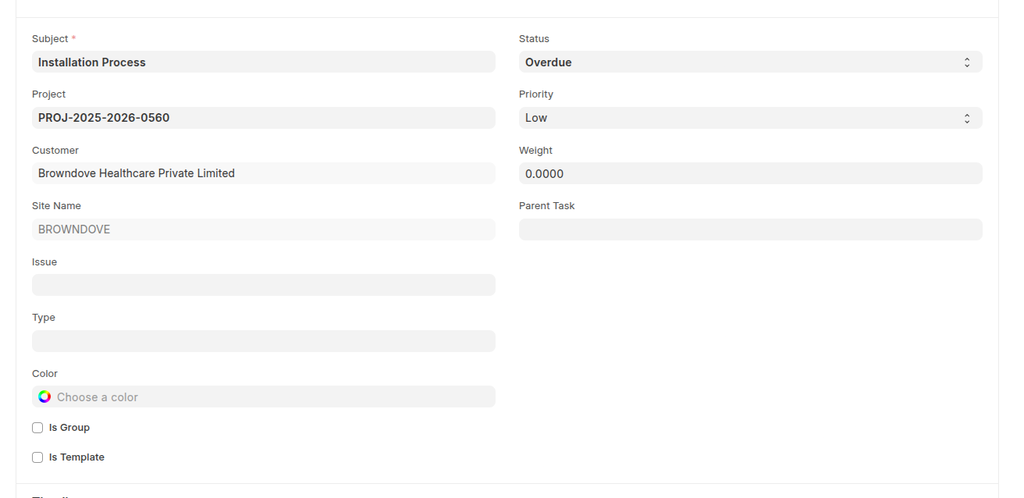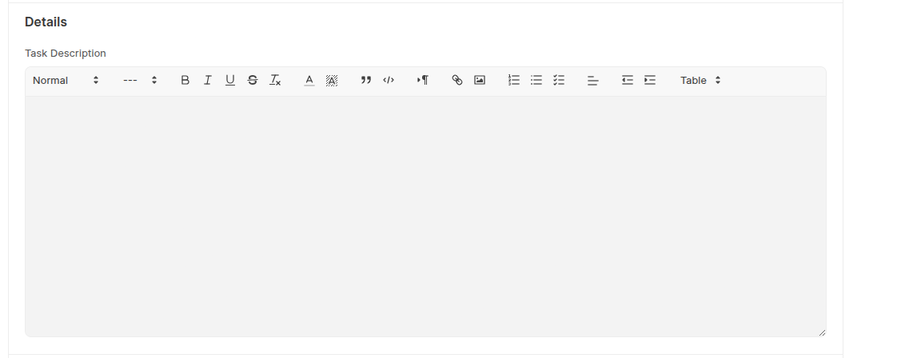Task
By Shyam Sunder on September 25, 2025
BeginnerERP Documentation ::
Tasks ::
Tasks are created according to the project. Each Project is divided into multiple tasks. Each project completion will be based on the task. Tasks can also be created separately without project reference.
1. First Section: Task Details

Subject: Task name, Mainly this is set by Project Template
Project: Project ID
Customer: Customer name, it will auto fetch form project.
Site: Project / Site name, it will auto fetch form project.
Issue: issue ID, if an issue occurs on current task. But mainly we create issues against the project.
Type: Task type,
We can define the task type and use it here. But currently we are not using it
Color: set a color for task
Is group: checkbox. To make a parent task, we will set ”is group”
Is Template: checkbox. To make a template task.
This template task is used on Project Template. If we create a template, then we can set standard data related to the task. like Task name, Description, Begin Time, Duration.
Because an auto created task, through a project template, has the property of template task. So we have to set the template task carefully.
Status: It has below drop-down options
Open
Working
Pending Review
Overdue
Template
Completed
Cancelled
Priority: It has below drop-down options
Low
Medium
High
Urgent
Weight: Float, Task Weight, this is used for task completion method
It will also set by task type, but currently we are not using it
Parent Task: Link, to link with parent task
Completed By: Link, Please enter user here,
It will only appear is task status is “Completed”
Completed Date: Data,
It will only appear is task status is “Completed”
2. Second Section: Timeline

Expected Start Data: Date,
It will also come from template task, if we set Begin Date
Expected Time (in hours): Not uses that because we are using start date and end date here
Begin ON (Days): Int, No of days. It will only appear if we check “Is Template”.
We can set the Expected Start Date through this.
Expected End Data: Date,
It will also come from template task, if we set Duration (Days)
% Progress: Percentage, this is used for task completion method
Duration (Days): Int, No of days. It will only appear if we check “Is Template”.
We can set the Expected End Date through this.
Is Milestone: Check, if we want to make current task as milestone
3. Third Section: Details

Task Description: Text Editor, some description related to task
4. Forth Section: Dependencies

It is a child table, here we link dependent task
Task: Link, Dependent task id
Subject: Read-only, it will fetch automatically from task
5. Fifth Section:

It will get the data from time-sheet, currently we are not using it
Actual Start Date (via Time sheet): Date, read-only, fetch from time sheet automatically
Actual Time in hours (via Time sheet): Date, read-only, fetch from time sheet automatically
Actual End Date (via Time sheet): Date, read-only, fetch from time sheet automatically
6. Sixth Section: Costing

Total Costing Amount (via Time sheet): Currency, read-only, fetch from time sheet automatically. It will get the data from time sheet, currently we are not using it
Total Expense Claim (via Time sheet): Currency, read-only, fetch from expense claim automatically
Total Billable Amount (via Time sheet): Currency, read-only, fetch from time sheet automatically. It will get the data from time sheet, currently we are not using it
6. Sixth Section: More Info

Review Date: Date, Only Appear if status is “Closed” or “Pending Review”
Closing Date: Date, Only Appear if status is “Closed”
Department: Optional, select department from department master
Company: Link, select company
More articles on ERP Documentation